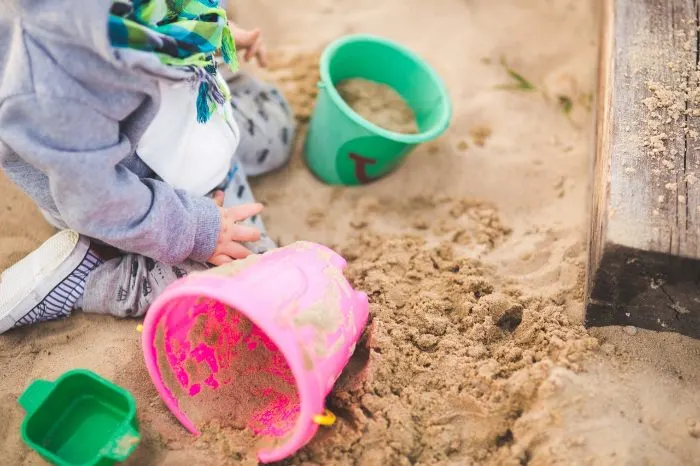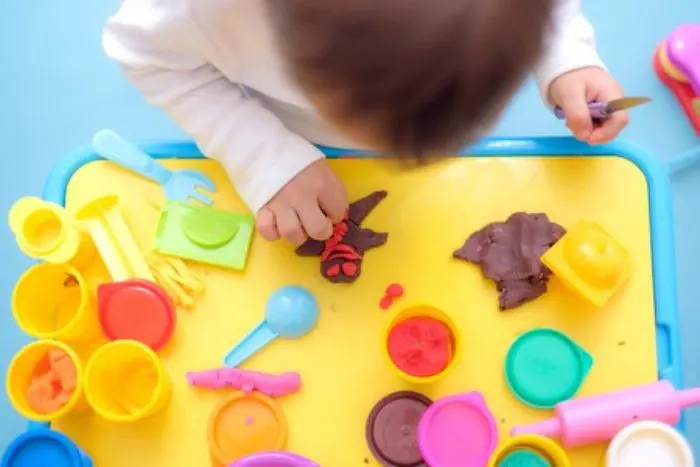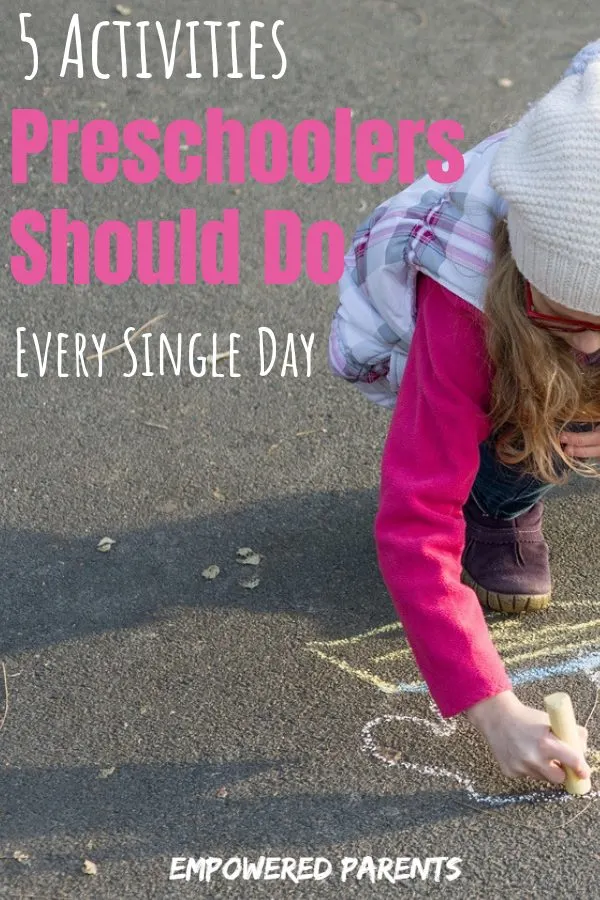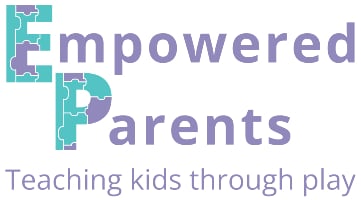The early years are a time when children are learning and growing at a rapid rate. As a parent or teacher, you may want to know what is the best way for your children to spend their time.
Here is a breakdown of the five best activities for early childhood development.
When does most of the learning occur and what are the best activities for young kids to be doing in order to learn optimally?
The answer is simple.
Play!
If children are spending the majority of their time playing every day, you can rest assured they are learning.

Read on to find out about simple play opportunities you can set up that your children will benefit from doing every day.
The preschool years are for play. Very intentional play.
During these years, all the most important foundations are being laid down and the skills needed for formal education are being put in place.
Most activities do not involve academic work or worksheets (as they are not really developmentally appropriate for preschoolers), and they can be categorized loosely into about 5 different types of activities.
They are all centred around play and they are the activities that all good preschools have built into their daily programs.
5 Early Childhood Development Activities
If you are looking for early childhood development activities to do at home or in class with your kids, as long as they fit into one of the following categories, you will know they are age-appropriate and educational.
1. Movement Activities
Movement involves free play, which gives children time to run, skip, throw, catch, gallop, jump, hop, bend, balance, walk, climb, hang, etc.
Guided movement activities are also great and can be planned by adults with a specific purpose in mind. Here are some examples:
- Obstacle courses
- Balancing beams
- Throwing and catching games
- Hopscotch, leapfrog, etc.
2. Music Activities
Music involves activities such as:
- Learning simple nursery rhymes and poems
- Singing songs
- Playing with musical instruments (especially home-made ones)
- Discovering sound through body percussion
- Dancing and rhythmic moving – also develop gross motor skills
- Playing music games
Music is not just about learning to sing and play instruments.
Through music, children improve their vocabulary, memory, cognitive abilities, listening skills, auditory processing skills, rhythm, and many more things.
Many of these skills are needed to be able to learn to read.
Children are naturally drawn to music and enjoy it without the self-consciousness that many adults feel when singing and dancing.

3. Creative Art
Which child doesn’t love art? Most children want to draw, paint and be creative every day.
They should have exposure to many different activities and mediums:
- Drawing with wax crayons, pencils, pens, chalk, etc.
- Painting – including finger painting, stamp painting, painting with brushes and sponges, etc.
- Box construction – such as building things out of waste materials
- Cutting, tearing, pasting and collaging
Here are some really awesome creative art activities that are simple and require no prepping!

4. Reading
The benefits of reading to children are endless and bedtime stories should be a non-negotiable, every single day.
Parents and teachers should read to children in order to develop many skills.
It is also a great time to stimulate higher-order thinking skills and get your children involved in a discussion that is sure to develop critical thinking and vocabulary.
5. Play
I’ve left the best for last. Although the four activities listed above are still part of play, I thought I’d list this separately just to mention the various types of play children engage in.
During play, children are learning non-stop! Here are some types of play:
- Fantasy, dress-up or symbolic play
- Physical play
- Structured games with rules, such as Duck, Duck, Goose
- Memory games and card games.
- Construction play (e.g. building with blocks or lego)
- Sensory play
- Fine motor play activities such as puzzles, pegboards and threading beads
Above all other activities, children need large pockets of time to play daily. Play is how they discover the world and make sense of it.
What About Learning Numbers and Letters in Preschool?
You may be concerned with whether your children are learning letters and numbers, or reciting the days and months in order.
During the preschool years, learning the letters and numbers is not quite as important as you might think!
Why? Because your child will learn those things easily when they are ready. And they will be ready because they will have engaged in the right activities that develop pre-reading, pre-writing and early maths skills.
Here is a quick look at learning numbers and letters.
Learning Numbers
A child may count to 100 but they are not necessarily mature enough to have any concept of what those numbers actually represent.
They learn the value of numbers when playing, for example, in the sandpit or the bath.
When they fill up a cup of sand and turn it over, then fill another and turn it over next to the previous one, they are learning concepts such as two items or one more.
The more they play and discover, the more concepts they learn – they compare numbers, make patterns and experiment with sizes.
They may be able to rattle off the numbers out loud, but this is only one aspect of mathematics – rote counting.
Children develop a true sense of numbers when they learn one-to-one correspondence and conceptualize what the numbers actually mean.
Learning Letters
In order for children to recognize the sounds in letters, they need to develop their auditory processing skills through play.
Nursery rhymes, poems and songs serve more of a purpose than just entertainment and fun!
Then, learning to write requires building gross motor skills through movement and play.
Fine motor skills are then developed which enable a child to hold a pencil, control it and form letters carefully.
These foundational skills cannot be rushed and pushed aside.
The last level is being able to recognize the letters and the sounds they represent when combined, and putting them together into meaningful words and sentences to be read.
Therefore, it is not necessary for children to be writing, adding numbers and reading in preschool.
Know that if your children are coming home from school looking like they rolled in mud, with art that doesn’t resemble anything Instagram-worthy and happily signing a tune, they are probably getting a very good education.
Homeschooling? Stick to these main types of activities to help your kids thrive.


Mary Takyi
Friday 26th of April 2024
Thank you very much I'm adopting these activities in my teaching skills
Tanja McIlroy
Friday 26th of April 2024
That's wonderful, Mary! You're welcome.
John
Sunday 15th of January 2023
Hi! I want to leave my opinion about developing children.
I’ve a little son and I’m very serious about his development. Nowadays when internet, smartphones and so on are everywhere and make people to degrade the most necessary things are developing and critical thinking. I thank you very much for your advices, which I’ll using for my son’s growth. All the best!
Tanja Mcilroy
Monday 16th of January 2023
Thanks for your comment, John!
Tshepiso Sesing
Thursday 24th of November 2022
This opened my eyes,very helpful in our school we are using ACE so I didn't understand why I they saying Pre RR and Grade R they are not supposed to write anything now I get
Kenzie Beachy
Wednesday 9th of November 2022
i like this so much; thenk you so much for this
Tanja Mcilroy
Wednesday 9th of November 2022
Thank you!
Anu Richard
Sunday 3rd of July 2022
Hi Tanja, thanks so much for your write-up. It has really happened during my research assignment. Thanks.
Tanja Mcilroy
Sunday 3rd of July 2022
You're welcome! Thanks for reading.